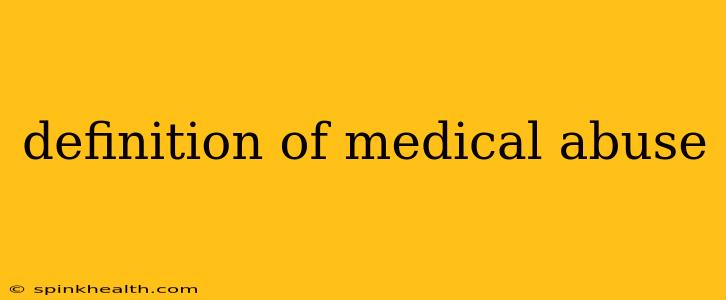Medical abuse, a term often overshadowed by more readily recognized forms of abuse, represents a significant threat to patient well-being. It's not simply about bad bedside manner; it's a spectrum of actions and inactions by healthcare professionals that cause harm. This exploration will delve into the definition, its various forms, and the crucial implications for patient safety.
What is Medical Abuse?
Medical abuse encompasses a range of harmful actions and omissions by healthcare providers. It’s characterized by the intentional or unintentional infliction of harm or neglect on a patient through medical treatment or care. This harm can manifest physically, emotionally, or psychologically. Unlike medical malpractice, which focuses on negligence, medical abuse often involves a deliberate disregard for patient welfare, even if the specific intent isn't always easily proven. It's a complex issue involving power dynamics, ethical breaches, and the potential for systemic failures within healthcare systems.
What are the Different Types of Medical Abuse?
The landscape of medical abuse is multifaceted. Here are some key forms:
1. Physical Abuse: This includes actions causing physical harm, such as unnecessary surgery, inappropriate medication administration, or rough handling leading to injury. Think about a scenario where a doctor performs a procedure without proper consent or justification, leading to complications.
2. Emotional Abuse: This encompasses verbal abuse, threats, humiliation, or the intentional infliction of emotional distress. Imagine a healthcare professional constantly belittling a patient, refusing to acknowledge their pain, or dismissing their concerns.
3. Neglect: Neglect refers to the failure to provide necessary medical care, leading to deterioration in a patient's health. This can range from ignoring vital signs to failing to administer essential medications. A classic example is a nursing home failing to provide adequate care for a bedridden patient, leading to pressure sores and infections.
4. Financial Abuse: This involves exploiting a patient's finances for personal gain. Examples could include billing for services not rendered, upcoding (billing for a higher-priced service than provided), or misappropriating funds.
5. Sexual Abuse: This is perhaps the most egregious form, involving any unwanted sexual contact or advances by a healthcare professional. This can range from inappropriate touching to sexual assault.
How is Medical Abuse Different from Medical Malpractice?
While both involve harm to a patient during medical care, there's a crucial distinction. Medical malpractice focuses on negligence – the failure to provide the standard of care a reasonably competent professional would have provided. It's about unintentional errors or omissions. Medical abuse, however, often involves intentional harm or a deliberate disregard for patient well-being, even if it doesn't always involve malice aforethought. The intent to harm is a key difference, though challenging to prove.
How Can Medical Abuse Be Prevented?
Preventing medical abuse requires a multi-pronged approach:
- Stronger regulations and oversight: Enhanced monitoring of healthcare providers and institutions, coupled with robust reporting mechanisms, are crucial.
- Improved patient education: Empowering patients to understand their rights and advocate for themselves can significantly reduce vulnerability.
- Whistleblower protection: Creating a safe environment for reporting suspected abuse without fear of retaliation is essential.
- Enhanced ethical training for healthcare professionals: Continuous education on ethical conduct and patient rights is paramount.
Who Can I Report Medical Abuse To?
Reporting avenues vary depending on location and the nature of the abuse. Typically, you can report to:
- Your state medical board: This body regulates healthcare providers within a specific state.
- The hospital administration: Report concerns to the hospital ethics committee or administration.
- Law enforcement: If the abuse involves criminal activity, contacting law enforcement is crucial.
- Patient advocacy groups: These groups can offer support and guidance.
Medical abuse is a serious issue that necessitates a vigilant and proactive approach. By understanding its various forms, recognizing the signs, and actively reporting suspected instances, we can collectively work towards creating safer healthcare environments for all.

